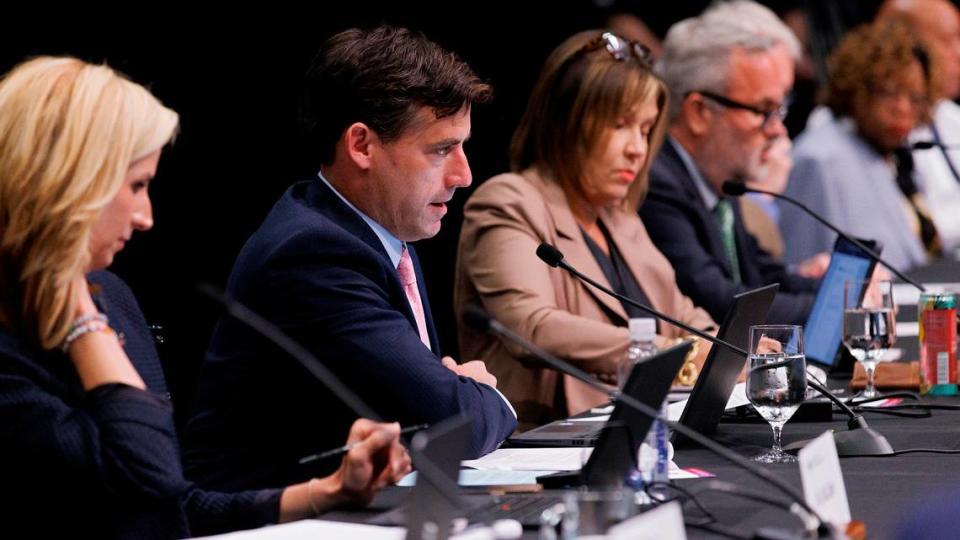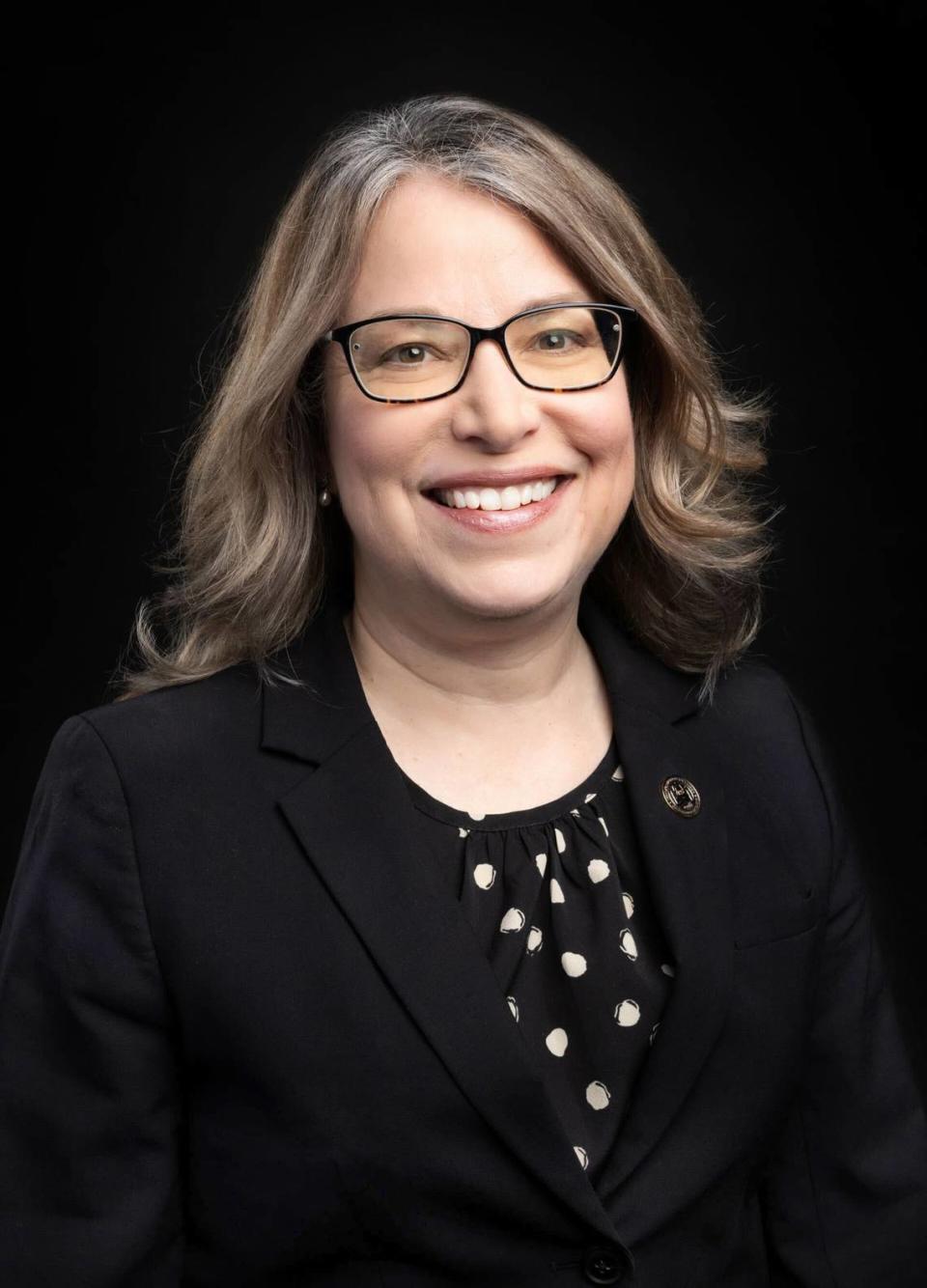Dean’s List: Public mostly voiced disapproval of UNC System action on DEI, records show
There were fewer than 24 hours between The News & Observer revealing the evening of April 16 that the UNC System Board of Governors would consider a policy targeting diversity, equity and inclusion (DEI) efforts, and a board committee voting to approve the move.
And there were fewer than 48 hours between the policy becoming public knowledge and the board’s public comment submission form for the meeting closing Thursday at 5 p.m.
But the short turnarounds didn’t keep some members of the public from making their opinions on the policy heard.
Public comment records provided to The N&O by the UNC System office show that 25 people submitted comments to the board for its April 17-18 meetings. Of those, 21 comments were about the proposed policy changes to diversity efforts at the state’s public universities. Two of the comments supported the board’s action. The remaining 19 denounced the move.
So, what did the comments say?
Welcome to Dean’s List, a weekly roundup of higher education news in the Triangle and across North Carolina from The News & Observer and myself, Korie Dean.
This week’s edition takes a deeper look at the public comments submitted regarding a Board of Governors committee’s vote to repeal the UNC System’s existing policy on diversity and inclusion, plus information on the new interim chancellor at Appalachian State University and the impending retirement of Campbell University’s president.
Public comments to Board of Governors regarding DEI
The Board of Governors, which oversees all of the state’s public universities plus the North Carolina School of Science and Mathematics, generally does not allow public comments during its meetings, but it accepts written comments through an online form ahead of full-board meetings.
Ahead of the board’s April meeting, the public comment submission form was open from April 9 until April 18 at 5 p.m.
The N&O was the first to report Tuesday, April 16, that the board’s University Governance committee would consider a policy repealing the UNC System’s existing policy and regulations on diversity and inclusion. Among other changes, the new policy is expected to impact DEI-related jobs that are currently mandated under the existing policy, either by eliminating the positions or by forcing their ties to DEI to be removed or revised.
The policy was added to the committee’s meeting materials that Tuesday afternoon, ahead of its Wednesday afternoon meeting. It was not included in the materials when they were first made available about a week before the meeting.
Public comments on the topic began to pour in sometime Wednesday, according to the records. The records show that students, parents, alumni, faculty and staff affiliated with seven of the state’s 16 public universities submitted comments.
In the two comments supporting the board’s proposed policy:
▪ Chris Kirby, a professor at UNC Charlotte, urged the board to eliminate funding for DEI efforts and activities throughout the university system, saying that those promoting the efforts “seek to inculcate unwavering adherence to predetermined political ideologies.”
Kirby wrote that UNC Charlotte has “a wide-reaching DEI bureaucracy” that includes several “high-level administrators.” Kirby wrote he believes the “bureaucracy” advances “an inherently political agenda” that “also wastes an extraordinary amount of taxpayer dollars.”
“State residents should not be subsidizing out-of-control administrative bloat that contributes to rising college costs and student indebtedness,” Kirby wrote. “Defunding the DEI bureaucracy would help restore the focus of all constituent institutions to their traditional guiding principles: freedom of academic inquiry, merit-based advancement, and scholarly excellence.”
UNC Charlotte, like many campuses across the UNC System, operates an Office of Diversity and Inclusion that is overseen by a chief diversity officer and employs other staff members. The office, which was established in 2020, has a stated mission “to guide UNC Charlotte toward inclusive excellence by creating a culture and climate where students and employees can access and thrive.”
“We do this by leading in developing, integrating, and advancing the university’s inclusive excellence strategy to support our vision of educating, inspiring, and empowering communities to champion humanity, care and dignity for all,” the office’s website states.
▪ Michelle Bardsley, a parent of two UNC System graduates, asked the board to “take steps to eliminate DEI programs and funding in our NC colleges and K-12 public schools.”
“Our NC educational institutions need to be focused on teaching our children and young adults’ employable career and workforce skills, leadership, and character education,” Bardsley wrote. “Let’s stay focused on the mission of public education in NC, spend tax dollars wisely, and successfully prepare our children and young adults to work and compete in a global economy.”

Among the remaining 19 comments, which opposed the board’s proposed policy:
▪ Tamika Henderson, a parent affiliated with UNC-Chapel Hill, wrote to the board to express “deep concern and strong opposition” to the proposed policy.
“As a concerned citizen, parent of a UNC student, and advocate for equal opportunity and inclusivity in education, I firmly believe that diversity and inclusion are crucial components of a thriving academic environment,” Henderson wrote. “The UNC System has long been recognized for its commitment to fostering a diverse and inclusive community, and the proposed elimination of diversity goals and jobs undermines these fundamental principles.”
Henderson said the proposal would “risk diminishing the reputation of UNC, devaluing a degree from UNC thereby creating a negative economic impact.”
“This proposal not only undermines the efforts of individuals who have worked tirelessly to promote diversity and inclusion within the UNC System, but it also sends a concerning message to current and prospective students, faculty, and staff who value and rely on the commitment to diversity,” Henderson wrote.
▪ Hope Murphy Tyehimba, a two-time alumna of UNC-Chapel Hill and former employee of East Carolina University, NC State University and NC Central University, wrote that she was “greatly troubled by the direction that the UNC Board of Governors is considering taking regarding this matter.”
Tyehimba said she credits her success at UNC, both as an undergraduate student and as a law student, to the support services she received from the university as a first-generation student from rural North Carolina. She later paid that success forward by advising other students from similar backgrounds, she wrote.
“The thought of UNC no longer providing specialized support and resources to African American students, and other students of color, is greatly troubling and concerning. The university is quickly transforming into an institution that I no longer recognize,” Tyehimba wrote. “Please reconsider taking any action that would limit the ability of DEI officers to be employed within the System and to continue providing much needed services to students like me who relied upon and provided such services to others.”
▪ Cameron Toler, a student at the UNC School of the Arts, wrote that the board’s decision to act on the policy during its meeting at the school was “insulting,” given that the university “flourishes without question as a result of DEI.”
“This moment is a scourge upon our institutions and I hope for the sake of every students wellbeing and the integrity of their education that a change is made in the leadership that led to this decision,” Toler wrote. “How dare this decision be made.”
▪ Sarah Ho, a staff member at the NC State University College of Veterinary Medicine, wrote to the board to describe the positive impact she sees DEI-related staff make at the college.
“They prepare our students well for a diverse and global workforce. They work to ensure ALL of our students feel a sense of belonging. Their efforts help to attract the best students, faculty, and staff to the University,” Ho wrote. “Our community would suffer greatly without them. Please do not cut this vital resource.”
▪ TaMera Harris, a graduate of NC Central University, denounced the board’s action, writing that “diversity is needed to make sure that an opportunity of higher education is afforded to everyone.”
Interested in submitting a comment to the board? The online form to submit public comments to the Board of Governors is expected to reopen in advance of the group’s May meeting, when it will vote on the DEI policy change through its consent agenda. The form to submit a comment can be found on the UNC System website: northcarolina.edu/leadership-and-governance/board-of-governors/meetings-materials/public-comment-sessions.
Interim chancellor named at App State
Heather Hulburt Norris will serve as the interim chancellor of Appalachian State University.
UNC System President Peter Hans appointed Norris to the role following former Chancellor Sheri Everts’ resignation last week.
Norris had been serving as the university’s provost and executive vice chancellor since 2020, first on an interim basis before securing the role fully in 2021. She first came to the university in 2003 before rising through the ranks to become dean of the university’s Walker College of Business in 2016.
“Dr. Norris is an experienced and talented leader who is well regarded in the App State community,” Hans said in a news release Friday. “She has served in various roles at the university, from faculty member to dean to provost, and she has excelled at all of them because of her collaborative style and her commitment to public service. I’m grateful to her for taking on the position of interim chancellor.”
Norris said she is “passionate about the success of our students, faculty and staff” and is looking forward “to working collaboratively with faculty, staff, students and members of the communities we serve to ensure the continued success of this great institution.”
The UNC System news release said that a search for the next permanent chancellor of App State will be launched “in the near future.” The system is also searching for new chancellors at four other universities: UNC-Chapel Hill, NC A&T State University, Winston-Salem State University and NC Central University.

Campbell University president to retire
Campbell University President J. Bradley Creed will retire next summer after 10 years in the role, he announced to the university’s Board of Trustees last week.
Creed, a scholar and historian of religion, in 2015 became the private, Christian university’s fifth president after serving in administrative roles at Samford University and the George W. Truett Theological Seminary at Baylor University.
During his time at the helm of Campbell, Creed led the university through the COVID-19 pandemic and oversaw the university’s most successful capital campaign, which raised more than $105 million, among other accomplishments.
“Serving as Campbell’s president has been an honor and the capstone of my career in higher education,” Creed said in a news release. “I am thankful for the many wonderful people who assisted and supported me, and especially for the opportunity to make a difference in the lives of our students. After more than 30 years of leadership in higher education, I’m eager to take on other projects and to spend more time with my loving wife, children, and grandchildren.”
Creed will remain as president for the next year “to keep Campbell moving forward and to ensure a smooth transition to his eventual successor,” Board of Trustees Chair Gene Lewis III said in a news release.
“Thanks to President Creed, Campbell is poised to make great strides under a new leader, who will elevate our university among private institutions of higher learning in the heart of one of America’s fastest-growing states,” Lewis said. “That should be an exciting opportunity for strong candidates nationwide. Our board looks forward to working closely with a search consultant and President Creed to identify the next leader, who will take Campbell to new heights.”
Sign up for The N&O’s higher education newsletter
That’s all for this week’s roundup of North Carolina higher education news. I hope you’ll stay tuned for more.
Like what you read here and want to be on our mailing list when the Dean’s List newsletter launches? Have suggestions for what kind of content you’d like to see featured in the future? Let us know by filling out the form below:

